As a former high school Interior Design teacher, one of my favorite units to teach was flooring! My students weighed the pros and cons of different types of flooring and even calculated the cost for a small fixer upper. They were always surprised at how expensive it was!
After all, flooring is a big investment and a huge contributor to the overall aesthetic and functionality of a home.
Our home has beautiful engineered hardwood throughout the downstairs and carpet upstairs. Except last year we removed the carpet from the stairs and installed a stair runner! Click here for my step-by-step tutorial!
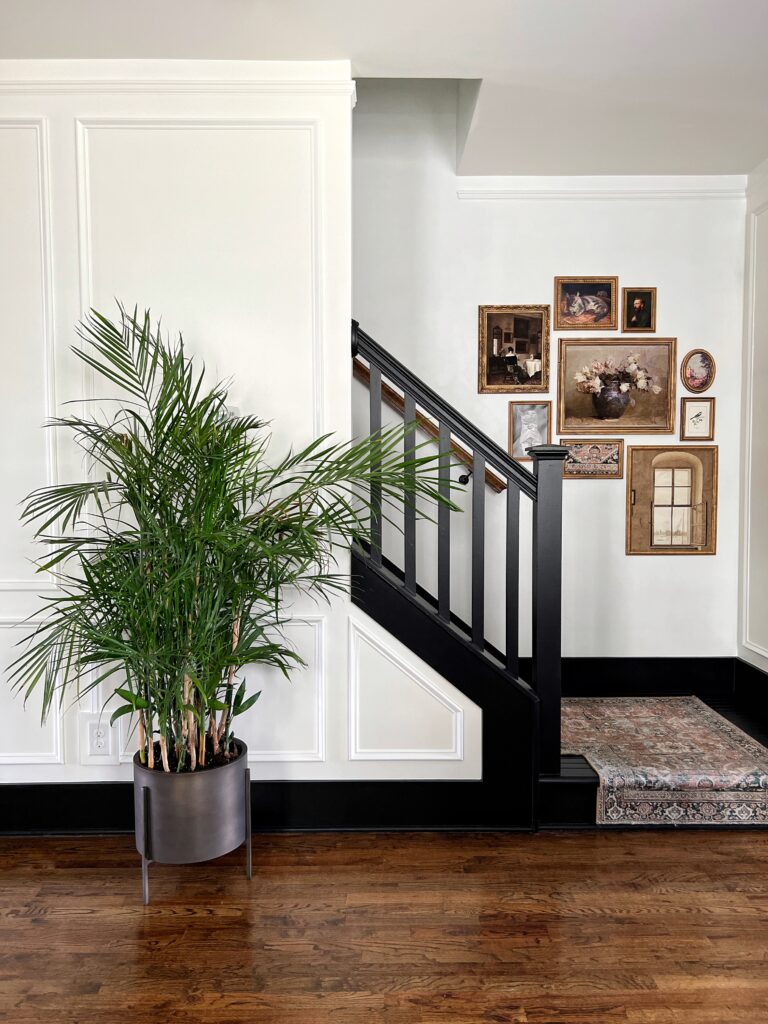
We’re working on our guest bedroom upstairs and decided to install new flooring in there! We plan to continue this flooring throughout the second floor with time.
After shopping both online and in stores, we decided to go with one of these two flooring types; luxury vinyl planks or engineered hardwood.
At the end of this post I’ll share what we decided to go with and why, but let’s start by defining the these two flooring options:
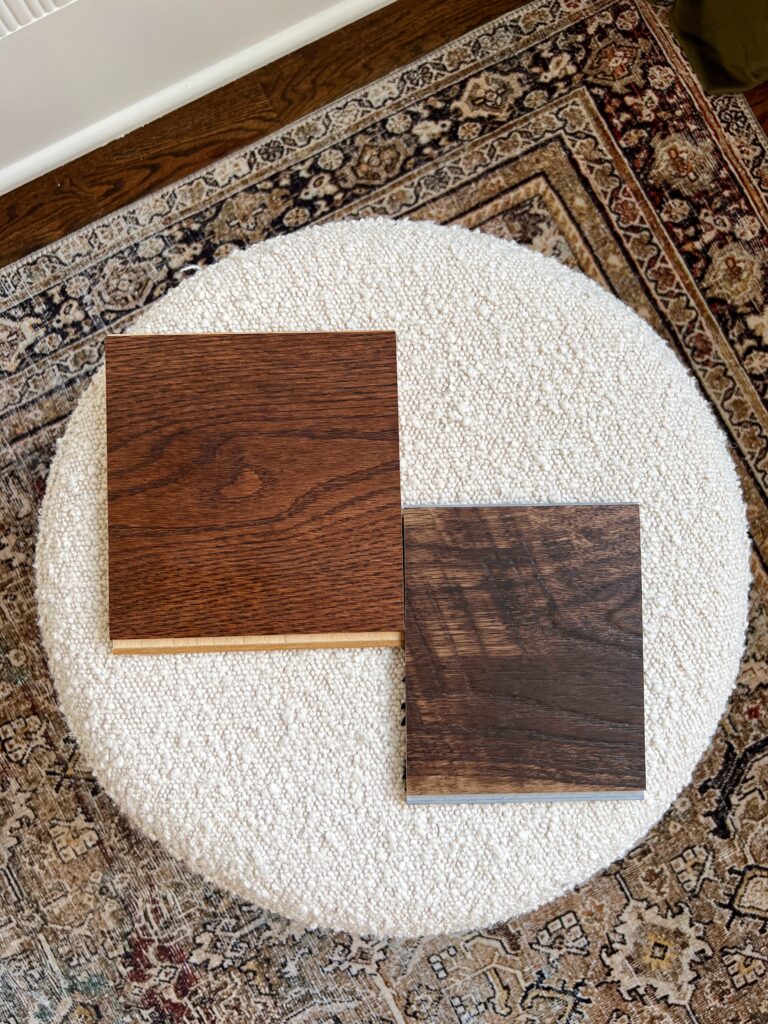
Engineered Hardwood
Engineered hardwood consists of multiple layers of building materials with a thin top layer of real hardwood on top.
The bottom layers beneath the real hardwood can vary, but often consist of plywood, particle board, or MDF.
Luxury Vinyl Planks (LVP)
Vinyl floors haven’t always had the best reputation, but we’ve come a long way since sheet vinyl. Now LVP is not only considered high-quality, but it’s one of the most popular flooring options.
Luxury vinyl planks (also referred to as vinyl plank flooring or LVP) are synthetic flooring planks that mimic the look, and sometimes feel, of real wood.
Luxury vinyl tile is essentially the same product, but cut to mimic the look of natural stones or ceramic tile.
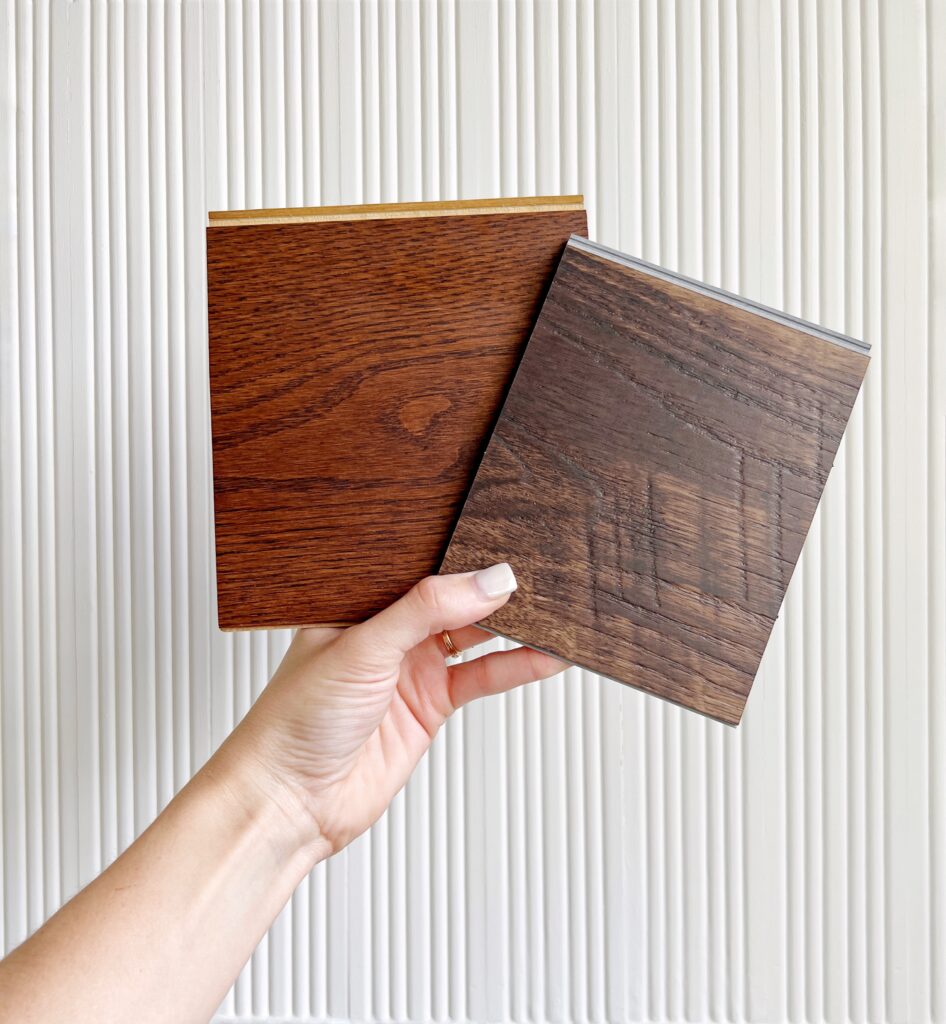
5 Things to Consider
1. Budget
Engineered hardwood and vinyl plank flooring are two affordable alternatives to solid hardwood floors.
Like most products, there are varying levels of quality to choose from. A good quality version of luxury vinyl flooring is comparable in price to a mid-range quality engineered hardwood.
Engineered Hardwood
On the high end, engineered hardwood costs between $8-$13 a square foot. On the low end, it costs on average of $3-$5 a square foot.
Vinyl Plank Flooring
Luxury vinyl flooring costs on average $2-$7 a square foot, with some high-end versions costing up to $12 a square foot.
You also want to consider the fact that engineered hardwood will add value to your home. Since it is partially real wood, it’s considered the real deal.
2. Installation
This part goes hand in hand with budget. Are you planning to install the flooring yourself or would you hire out? Installation costs can be high so this is important to consider before making your decision!
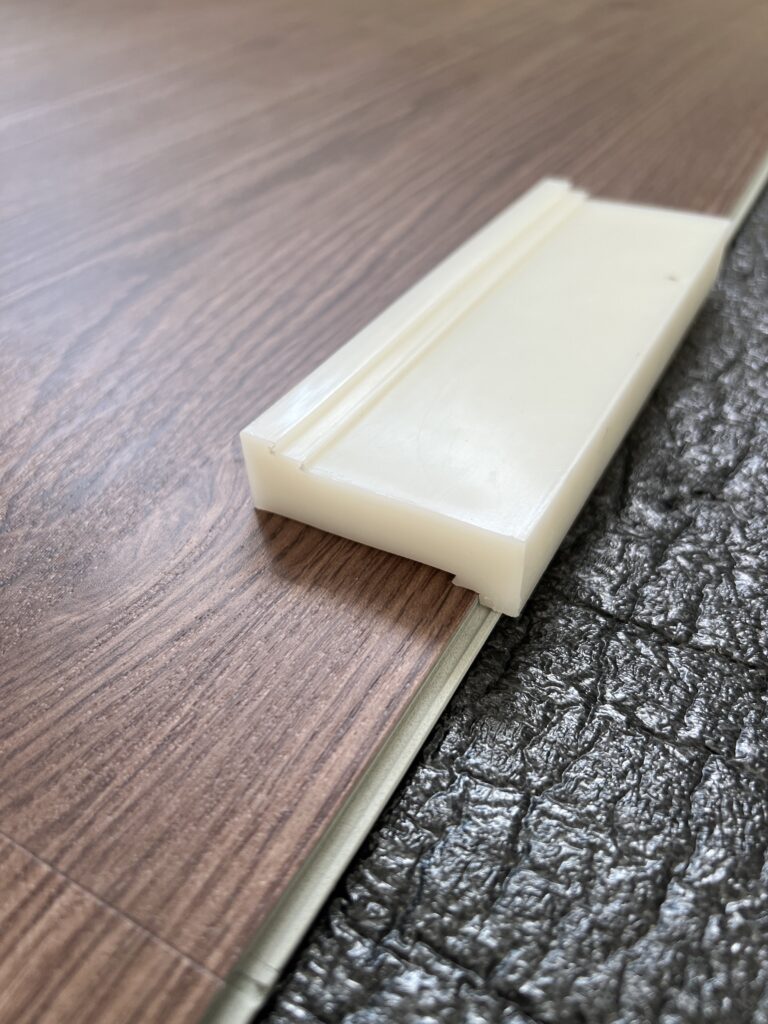
Engineered Hardwood
There’s a few different ways you can install engineered hardwood. Floating floors would be the most DIY friendly.
You also have the option to glue down engineered hardwood to a concrete subfloor or nail/staple the flooring to a plywood subfloor.
Learn more about these install methods here.
If you plan to hire professionals, it could cost an additional $3 to $10 per square foot.
Vinyl Plank Flooring
Vinyl plank flooring is a popular choice due to easy installation! You can get a floating floor or a peel and stick option- both very DIY installation friendly!
To have vinyl plank flooring professionally installed, it can cost an additional $1 to $5 per square foot.
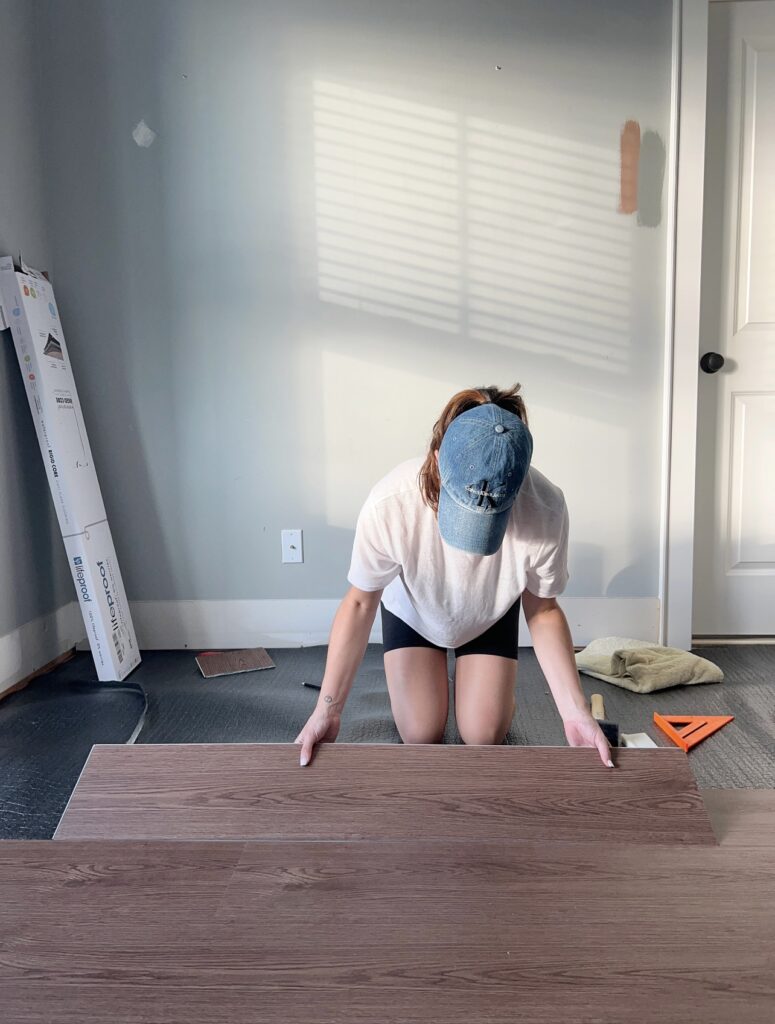
Click here my my step-by-step tutorial on how to install vinyl plank flooring!
3. Aesthetics
It’s no surprise that aesthetics are important to me, but let’s be real- they’re important to most people and definitely need to be considered when making a flooring decision.
Both engineered hardwood and vinyl plank flooring have lots of options in terms of grains, colors, finishes, and plank widths.
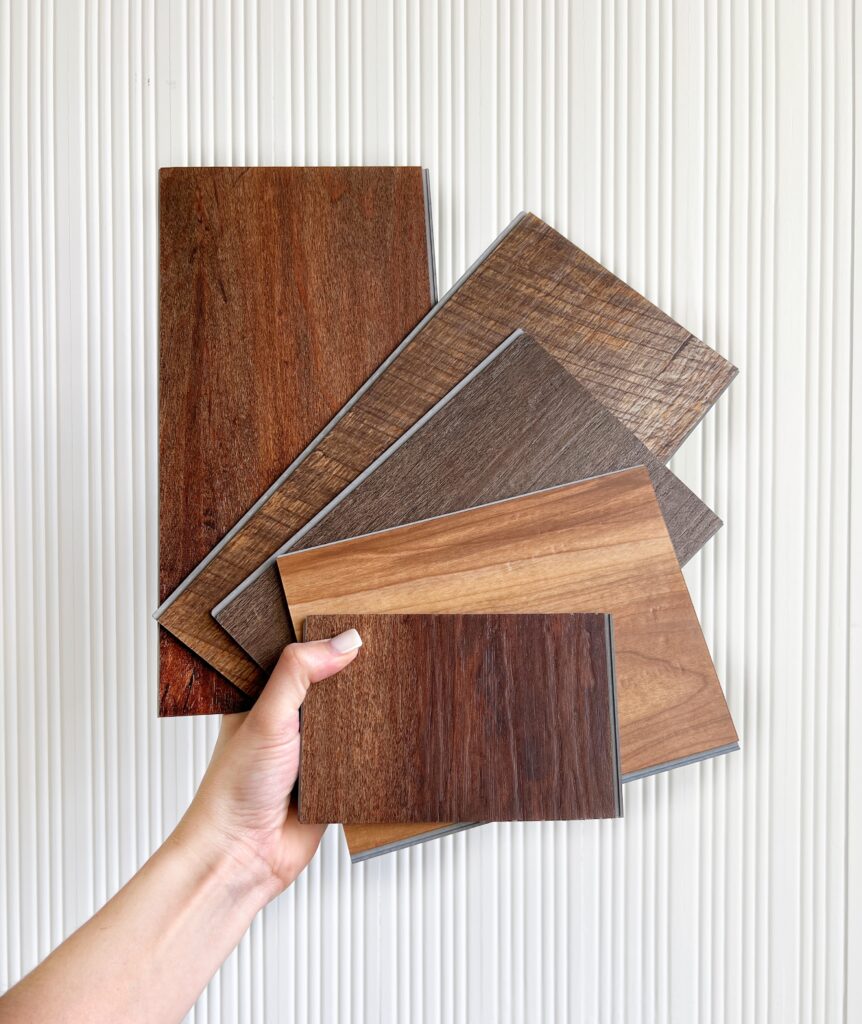
Engineered Hardwood
The best part about engineered flooring (in my opinion) is the fact that you’re getting the true look, and feel, of solid hardwood flooring. Natural wood has so much warmth and character and that’s hard to beat!
Vinyl Plank Flooring
A quality vinyl flooring does a great job of closely resembling the look of real wood. Some versions of LVP even have a raised grain texture.
But at the end of the day, vinyl flooring is made of synthetic material so you won’t get the same aesthetic or feel of hardwood like you can with engineered wood flooring.
Why is the sheen important?
When shopping for flooring it’s easy to get caught up looking at the color of the flooring, but you should also pay attention to the sheen.
The sheen refers to the level of glossiness! I have a summary of the different paint finishes in this blog post. I know we’re not talking about paint here, but it’s the same exact idea!
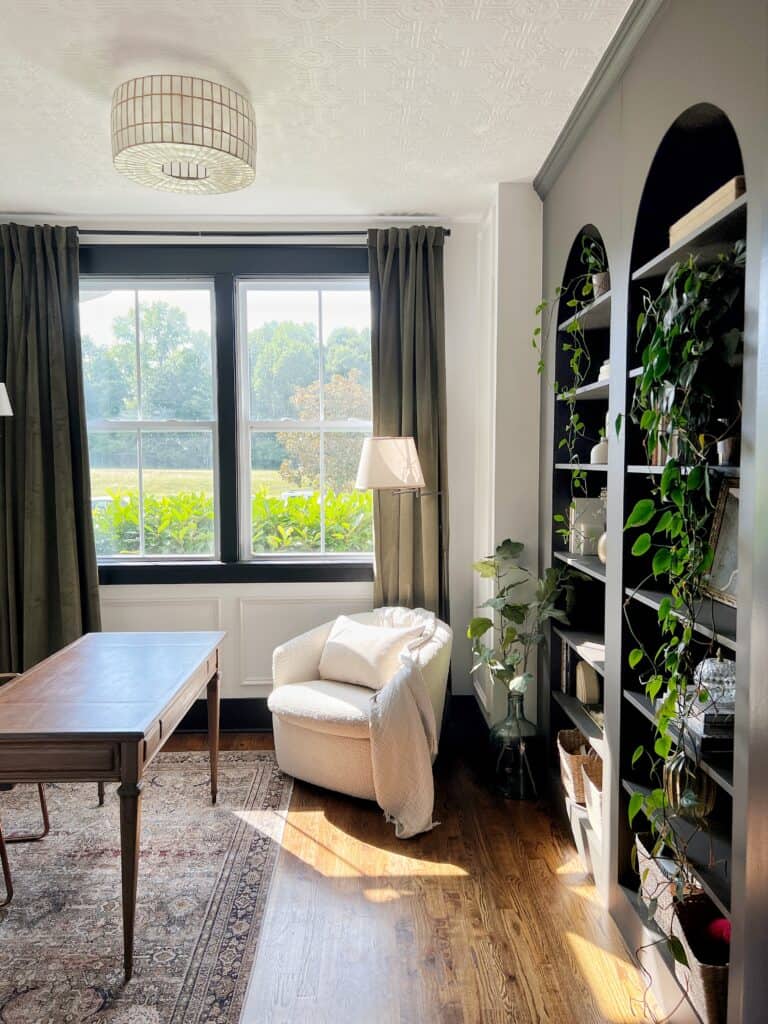
The higher the sheen, the more you’ll notice imperfections and dirt. On the contrary, a higher sheen can have a more elegant, polished look!
A matte finish (low gloss) flooring will hide imperfections and dirt, but some may feel a matte look has too dull of a finish.
4. Durability
Durability is a huge factor to consider before deciding what flooring is the best option for your home. Here’s a few things to ask yourself first:
- Do you have pets or young children?
- Where do you plan to use this flooring?
- What do you use the space for?
- Is it a room where you’re regularly using water?
Engineered Hardwood
Since the top layer of engineered hardwood is real wood, it’s prone to scratches and chipping. However, some brands use a protective finish to help prevent this.
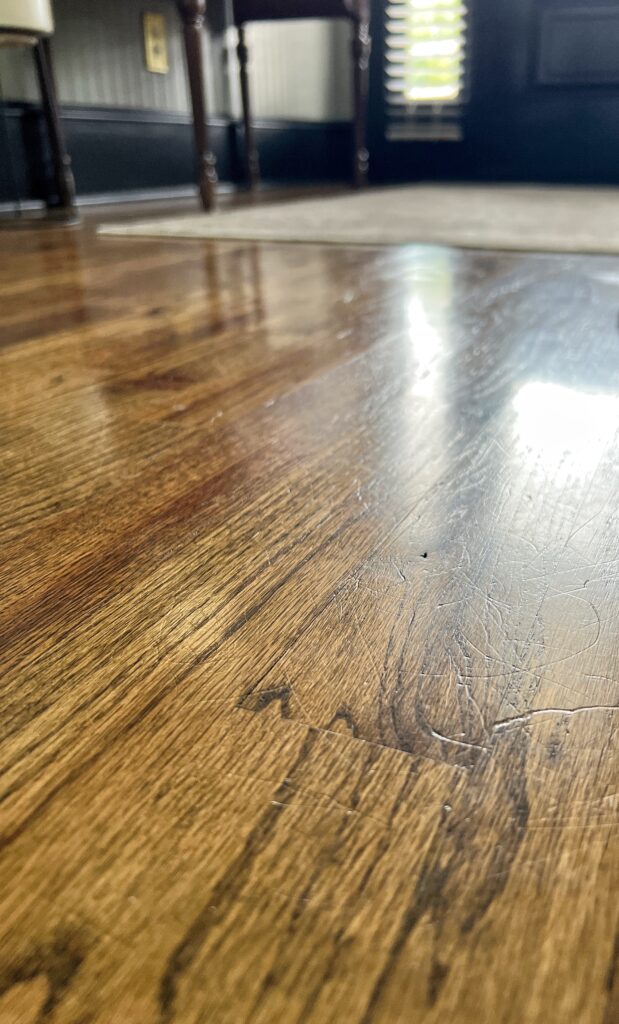
can you tell we have two cats?!
Engineered hardwood can also fade due to sun exposure. You’ll want to use rugs or close the blinds in areas that get a lot of sun.
Engineered hardwood has a lifespan of about 20-40 years.
Vinyl Plank Flooring
Most would argue that luxury vinyl plank flooring is a better choice in terms of durability. Vinyl plank flooring is usually both water resistant and scratch resistant. Especially the high quality options.
However, vinyl plank flooring can still dent or tear with heavy weight furniture. Just like engineered hardwood, it can also fade from sun exposure.
Vinyl plank flooring has a lifespan of about 5 to 25 years.
5. Maintenance
Some flooring options require more maintenance than others due to the flooring materials!
engineered hardwood
With a natural material like wood, you have to be a little more careful taking care of your floors.
Engineered hardwood is water resistant, but not waterproof! The natural hardwood layer is still susceptible to water damage and can warp. I recommend following your flooring manufacturer’s instructions for care.
If you choose a higher quality engineered hardwood with a top layer greater than 2mm, you can even sand and refinish the floors just like traditional hardwoods. This is a really awesome benefit!
vinyl plank flooring
Since LVP is a synthetic material, it doesn’t require much special care. Just regular maintenance like sweeping or using a wet mop from time to time!
What we chose for our new floors
After considering these 5 things, we decided on this luxury vinyl wide plank flooring. Here’s why:
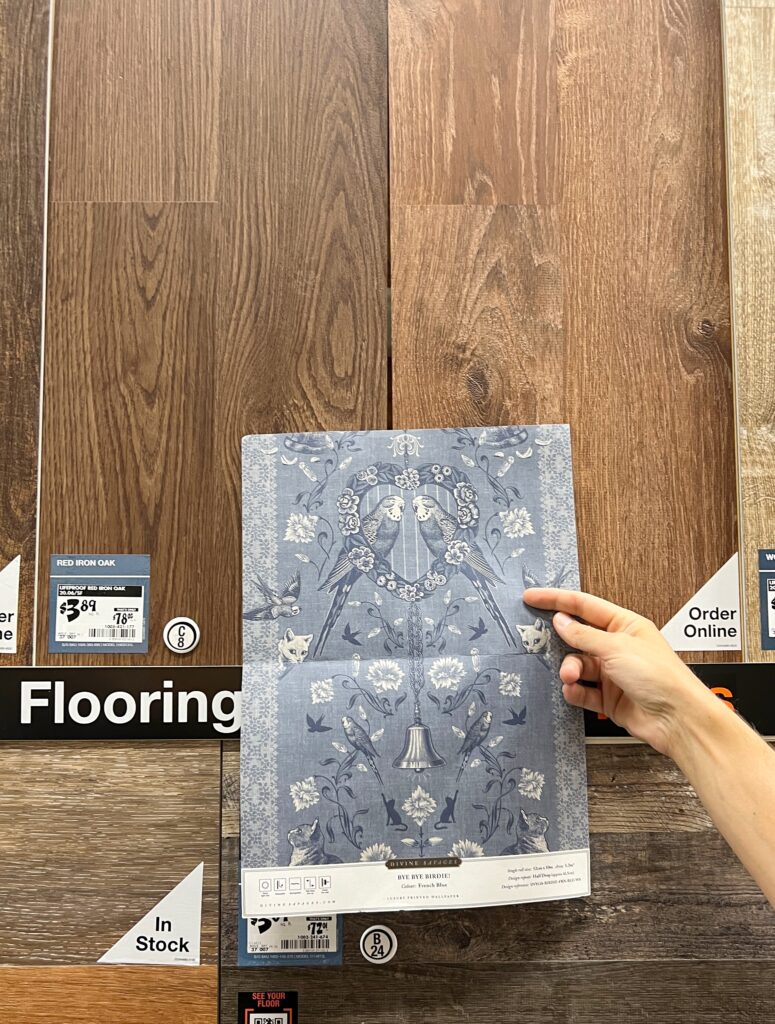
budget
LVP is more budget friendly for the quality standard we wanted. If we got engineered hardwood, we would have wanted a higher quality option which would ultimately cost more per square foot.
In terms of LVP quality, it’s ideal to get a thickness of 5-8mm and one that has a good warranty.
The flooring we chose has a 7mm thickness and a lifetime residential warranty!
installation
This was our first time installing flooring and we knew LVP was very DIY friendly!
One of the nice things about installing vinyl plank flooring over engineered hardwood is that you can use a utility knife for straight cuts! (for trickier cuts we used a jigsaw)
Here’s my blog post on how to install LVP flooring!
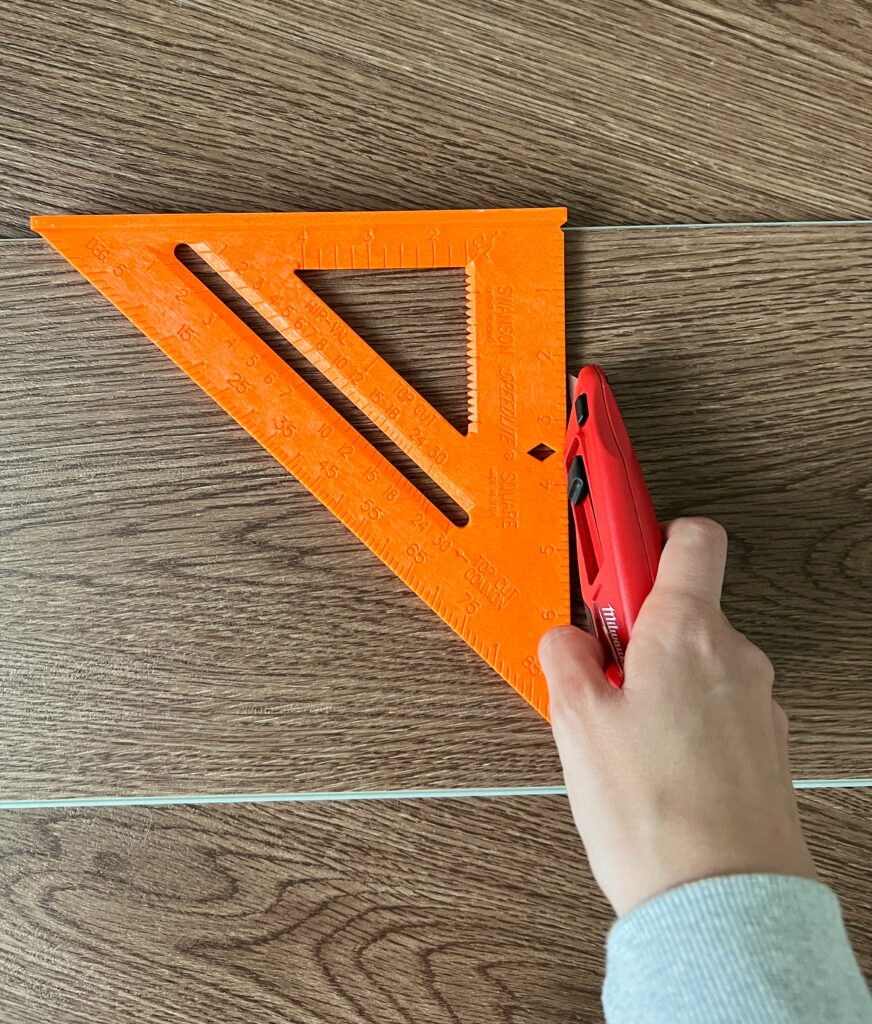
Aesthetics
Honestly, both flooring options had so many beautiful choices!
I love the look of this one because it’s a medium tone “wood” with a beautiful “grain”. It has the perfect amount of warmth to it!
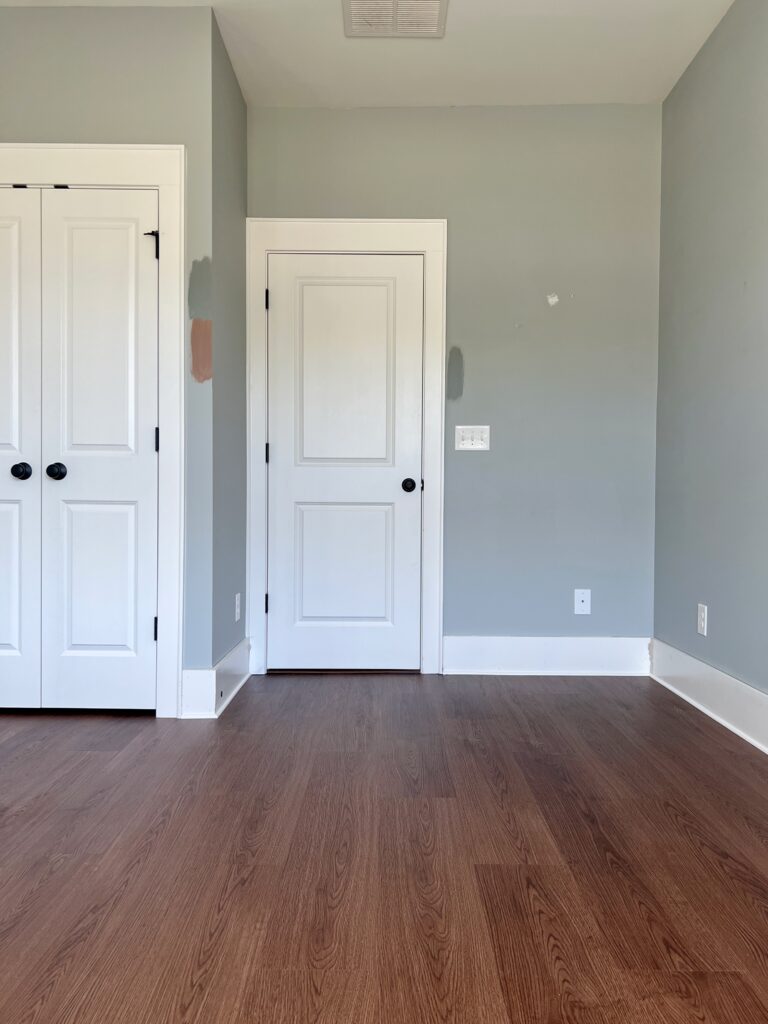
Durability
We chose a nice quality LVP in hope that it holds up well! We have two cats so we took that into consideration when making this choice!
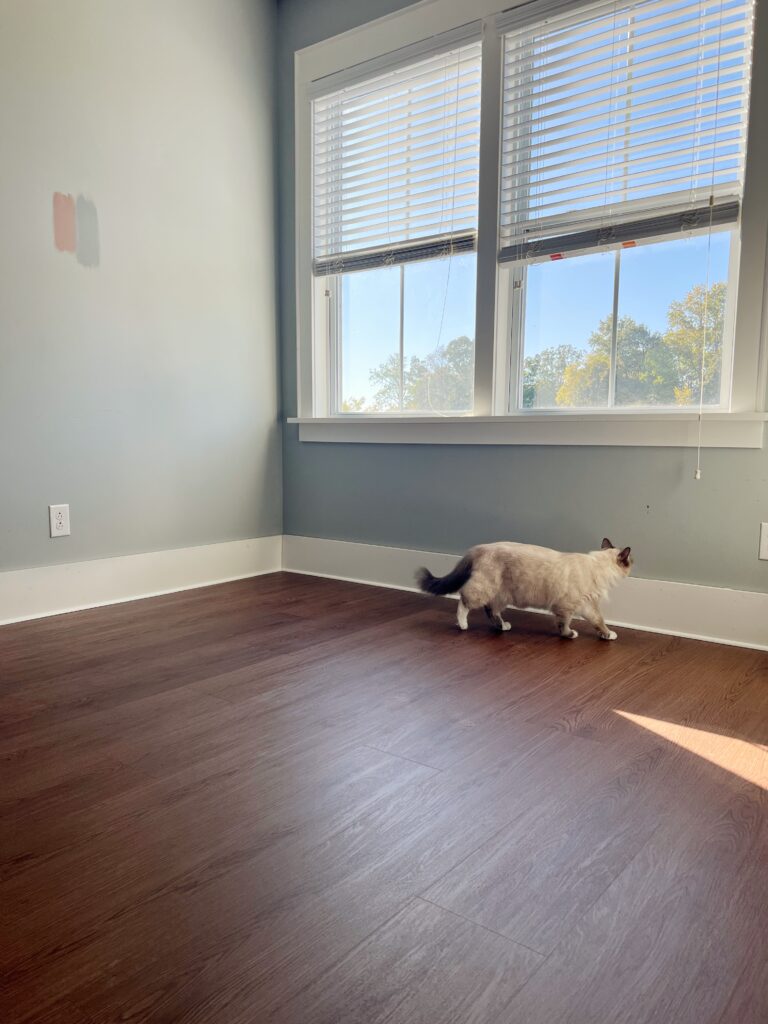
Maintenance
This wasn’t a huge factor in our choice, but the easier to take care of, the better! We don’t need waterproof flooring upstairs, but it definitely doesn’t hurt either.
In Comparison
It’s clear that vinyl plank flooring and engineered hardwood floors are both great options for any home.
It’s difficult to say which type of flooring is the better option. They have a lot of similarities, but also some major differences. Not to mention the various quality levels for both.
Before making your final decision, think about your situation and what would be the best choice for you and your family!
Here’s a chart summarizing the main differences:
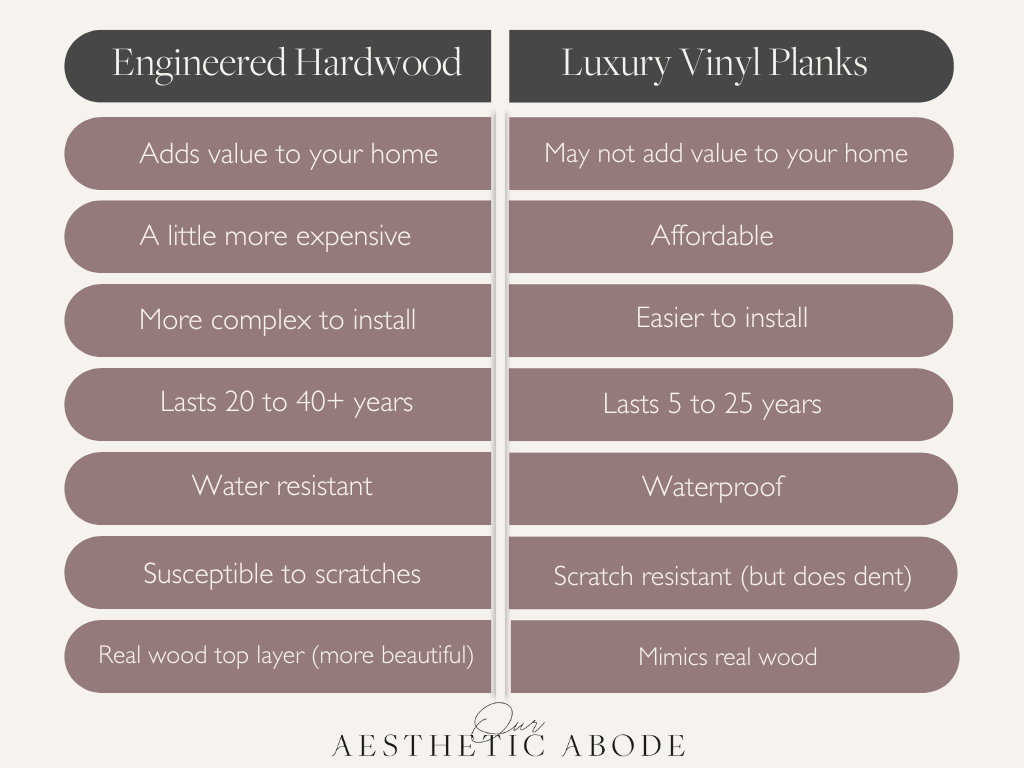
Here’s the final look of the LVP in our French vintage guest bedroom! Click here for all the details on this space!
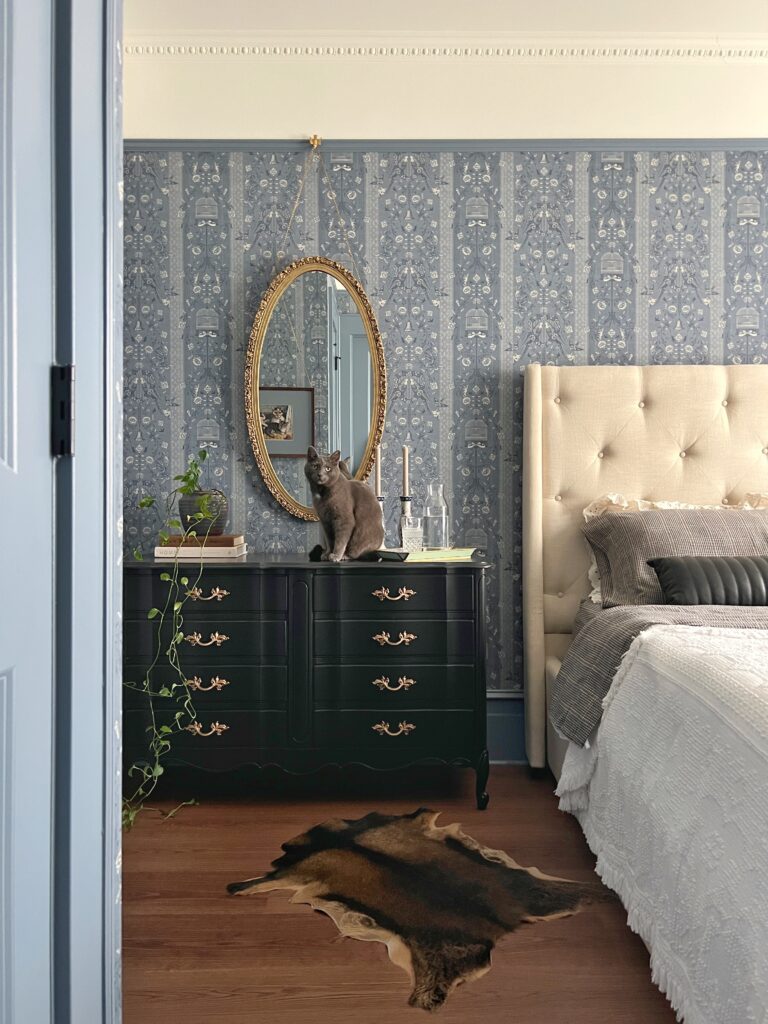
I hope this post was helpful! Please let me know if you have any additional questions. I’m happy to help 🙂
Elisha
So wonderful Idea for flooring . I like.
Yay! Glad you like it! 🙂
Great post!! Super helpful 🙂
Yay! Thank you Kate! So glad you found it helpful 🙂
Lots of great information. I have to say we both learned quite a bit from this article which is going to be so helpful deciding on our future flooring projects.
Woo!!! I’m so glad it was helpful for you! 🙂 Thank you for checking it out!!
Hi! is thicker LVP better? we are deciding between a 5 mm (lifeproof) and closer to 20 mm thickness (cali vinyl) but not mildew resistant… everything else the same resistance
Hi Jessica! Okay this is a great question. Double check on the numbers- there’s the thickness of the plank which is in mm, and then the mil which is referring to the wear layer. So when you said 20mil that is probably referring to the wear layer (it means 20 layers which is great quality!) The higher the wear layer, the longer the flooring will last! I was looking at one cali vinyl option and it had 6.5mm thickness and a 20mil wear layer which is awesome! I was looking at the flooring option we chose and that is 7mm thickness but only 12mil wear layer- so it just depends on your situation. Hopefully that’s helpful!
Nearly ten years ago I had 1000 sq ft of engineered wood flooring installed. It is a beautiful walnut, which has a really stunning grain. But if I had to do it over again with the options available now, I would install LVP. It would look the same at half the material cost. This — back in 2013 — was $10/sq ft installed…$6 in materials and $4 for installation. (We could have installed it ourselves but I moved in first due to a job transfer and my husband followed 4 months later, and I had to get it done before he arrived with all the furniture.) We will do a major kitchen remodel in 1-2 years, and when we do that we will update the flooring with LVP ($4-5/sq ft), and spend the savings on new trim for baseboards and doors. There are so many options available now and in many cases you can’t tell the difference without getting on your hands and knees to really examine it. I have loved the walnut, but it scratches wayyyy too easily, unlike the 3/4″ oak we put in our last house. We have to have a floating floor because we have a concrete slab and gluing down wood is a really bad idea.
Hi Janet! Thank you so much for sharing your experience! I’m a huge fan of walnut too… but I totally understand your reasoning behind going with LVP this time around! You’re right- there are so many beautiful options and I think they would be a great choice for your kitchen remodel. Best of luck! <3
This was extremely helpful. We really like LifeCore Engineered wood planks in Allegra Refresh but unsure as whether or not it will stand up to our 8 year old who loves slime and our dog. After reading this article, I am now leaning more towards a high-end LVP. Thanks for the information.
Yay, I’m so glad to hear that! And LOL to the slime!!
Thank you for this analysis. My wife and I are in the process of deciding on what type of new flooring to get and the information that you provided as well as your recommendations were very, very helpful. Chauncey
Hi Chauncey! Oh i’m so happy to hear that!! You’re very welcome and good luck with your new flooring 🙂
What product and color did you use for your flooring? I love the mid tone color. Would you also share a picture of it completed? Thank you!
Thank you for the information. Very interesting. One thing you did not mention is the plasticky sound and the cold feel of LVP. That is a deal breaker for me. We moved into an existing home with engineered hardwood on the main level and LVP in the basement. When you walk on the LVP, you can definitely tell you are walking on plastic, and it’s always cold! The engineered hardwood floor feels exactly like real solid hardwood. Worth it to me!
We are deciding between these two options… now that you’ve had it for a while, are you’d still happy with your decision of the LVP? It is so hard to make a final decision.
Hi Claire!
I know exactly what you mean! I think it just depends on the brand/quality of the LVP though! Ours doesn’t feel cold or have a plasticky sound, but i’ve definitely been in spaces with LVP that does!
But absolutely do what feels right to you- you definitely can’t go wrong with engineered hardwood! 🙂
Hi Brenda! I just added a few photos for you 🙂 Also, the product is linked right under the “What we chose for our new floors”!
Hi Brooke! Ugh, it really is so hard!! I still feel happy with our decisions, however, this was just a guest bedroom so it’s not like we’re using the space regularly. We plan to move soon and if we end up having to replace the floors in our next home, I’d splurge a little and go with a good quality engineered hardwood for the main areas personally. I just love the look of true wood!
I see so many million dollar homes on HGTV using Luxury LVP and it blows my mind! I love the look of it, but I’m so torn. My husband is old school and says there is nothing like hardwood, but ours is trashed from having 2 dogs over 100 lbs each. Do you think the floor sounds clicky when walking on it? I’m thinking of going with the 8mm 20 mil wear.
I’m just so nervous it will sound cheap. I’m wanting to do my entire 2 story home in it.
Hi Kim! It’s such a tough choice, I get it!! Ours doesn’t sound clicky when you walk on it- but at the same time- we *only* have it in our guest bedroom. There isn’t a lot of space to walk in there and not somewhere we frequent so I can’t give you the best feedback. But 8mm/20mil would be awesome quality for your situation! I would just really read into the reviews too if they have some. Good luck!!! <3
Great summary!
Also, don’t forget to consider the health effects.
Vinyl is made from fossil fuels and could contain/emit phthalates and VOCs (volatile organic compounds) which are carcinogenic and can cause kidney problems, breathing issues, asthma, trigger allergies, etc. A bit of research on the brand is wise – look for low or phthalate free, VOC free (and ensure good home ventilation), avoid floors with PVC softening agents. Wood and ceramics are safest as far as your health is concerned.
Just something else to consider especially if you have little ones crawling around on the floor.
Hi Bered! Thank you so much! Also wow, I had no idea about that aspect of it! Thank you so much for taking the time to share that- definitely great to know and consider as well.
Loved this article. Definitely helped narrow it down. In the second picture where you are holding the samples up, do you the info on it? I love that color and am looking for an Lvp in that color. Thanks!
Hi Amber!! I just looked- both samples were from LL Flooring! The sample on the left is engineered hardwood and it’s called “Wild Mare Oak QC 3/8″ x 6.25”. The sample on the right is the LVP and its called “Old Dominion Walnut 8mm w/pad Engineered Vinyl Plank Flooring”. Good luck!!! <3
Hi Elisha,
Thanks so much for the great information. I am in the process of purchasing flooring to go continuously from my living room into my kitchen and am leaning toward LVP. I have been told by numerous contractors LifeCore is a good flooring company. In addition, I appreciate learning about the mil wear and mm thickness. Wonderful article!
Hi Deidrea! You’re so very welcome!! I’m glad it was helpful and best of luck with your new flooring- that’s always exciting!